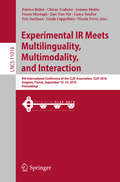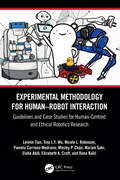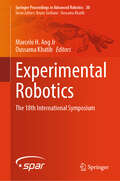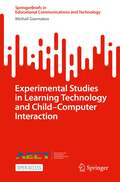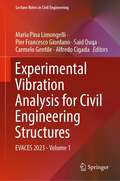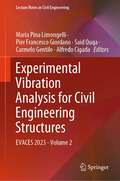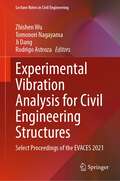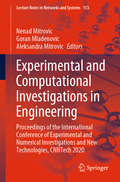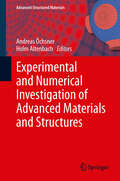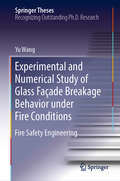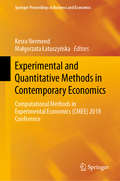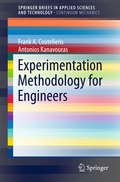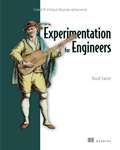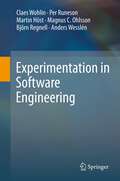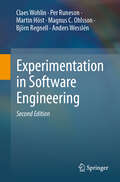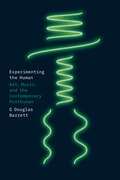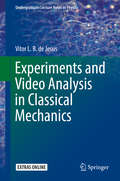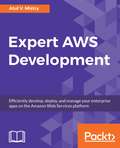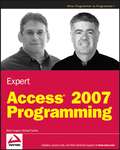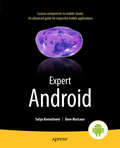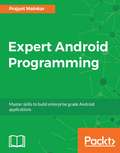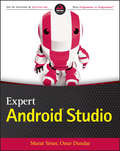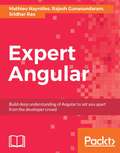- Table View
- List View
Experimental IR Meets Multilinguality, Multimodality, and Interaction: 9th International Conference of the CLEF Association, CLEF 2018, Avignon, France, September 10-14, 2018, Proceedings (Lecture Notes in Computer Science #11018)
by Fionn Murtagh Linda Cappellato Nicola Ferro Josiane Mothe Patrice Bellot Chiraz Trabelsi Jian Yun Nie Laure Soulier Eric SanJuanThis book constitutes the refereed proceedings of the 9th International Conference of the CLEF Initiative, CLEF 2018, jointly organized by Avignon, Marseille and Toulon universities and held in Avignon, France, in September 2018. The conference has a clear focus on experimental information retrieval with special attention to the challenges of multimodality, multilinguality, and interactive search ranging from unstructured to semi structures and structured data. The 13 papers presented in this volume were carefully reviewed and selected from 39 submissions. Many papers tackle the medical ehealth and ehealth multimedia retrieval challenges, however there are many other topics of research such as document clustering, social biases in IR, social book search, personality profiling. Further this volume presents 9 “best of the labs” papers which were reviewed as a full paper submission with the same review criteria. The labs represented scientific challenges based on new data sets and real world problems in multimodal and multilingual information access. In addition to this, 10 benchmarking labs reported results of their yearlong activities in overview talks and lab sessions. The papers address all aspects of information access in any modularity and language and cover a broad range of topics in the field of multilingual and multimodal information access evaluation.
Experimental Methodology for Human–Robot Interaction: Guidelines and Case Studies for Human-Centred and Ethical Robotics Research
by Dana Kulić Leimin Tian Tina L.Y. Wu Nicole L. Robinson Pamela Carreno-Medrano Wesley P. Chan Maram Sakr Elahe Abdi Elizabeth A. CroftLeading figures in Australian robotics research provide an overview and guidance for human–robot interaction (HRI) experimental design and evaluation methodologies that consider the ethical implications of the research and its applications from a human-centred and contextual perspective. The authors explain introductory and advanced topics in HRI with a focus on human-centred evaluation and ethical practices. They also provide an online interactive checklist tool for novice HRI researchers and students to deploy when designing their own studies.The book is structured into three parts. In Part I, the authors first review fundamental methodologies and provide an interactive checklist tool of the HRI experimental study life cycle to guide beginners to the field. Part II introduces an expanded set of approaches to support researchers and practitioners to create high-quality study designs that draw on practices from human-computer interaction, human-centred artificial intelligence, psychology and social science, and advance ethical HRI research. Finally, in Part III, the authors discuss a selection of HRI studies as examples of how the introduced methodologies are adopted, which will support the readers to further understand the fundamental and advanced methodologies described in Parts I and II. The diverse collection of case studies enables readers to grasp the state of the art and apply what they have learned in their own practices.This book is a vital resource for both students new to the field and experienced researchers and practitioners. The book’s practical focus and clear elucidation of relevant case studies, from its introduction to the HRI experimental study life cycle through to advanced methods emerging in the field, ensures that this will greatly benefit progress in the field with human-centred and ethical experimental methodology.
Experimental Robotics: The 18th International Symposium (Springer Proceedings in Advanced Robotics #30)
by Oussama Khatib Marcelo H. Ang JrThis book presents scientific and practical developments in the emerging trends of human-centric robotics in unstructured environments, covering Human–Robot Collaboration, Mobile Robotics and Manipulation, Field Robotics, Aerial Robotics, Humanoids, and Autonomous Driving. It offers insights into the latest scientific and technological development in robot–human interactions, advanced autonomy, and robust designs for real-world applications. This edition's approach is characterized by strong scientific developments backed by practical applications, offering detailed case studies and experimental data that support the theoretical foundations of robotic technology. By emphasizing the application side of research, it encourages readers to consider not only, theoretical advancements in robotics but also the implications and opportunities for real-world integration.
Experimental Studies in Learning Technology and Child–Computer Interaction (SpringerBriefs in Educational Communications and Technology)
by Michail GiannakosThis book is about the ways in which experiments can be employed in the context of research on learning technologies and child–computer interaction (CCI). It is directed at researchers, supporting them to employ experimental studies while increasing their quality and rigor. The book provides a complete and comprehensive description on how to design, implement, and report experiments, with a focus on and examples from CCI and learning technology research. The topics covered include an introduction to CCI and learning technologies as interdisciplinary fields of research, how to design educational interfaces and visualizations that support experimental studies, the advantages and disadvantages of a variety of experiments, methodological decisions in designing and conducting experiments (e.g. devising hypotheses and selecting measures), and the reporting of results. As well, a brief introduction on how contemporary advances in data science, artificial intelligence, and sensor data have impacted learning technology and CCI research is presented. The book details three important issues that a learning technology and CCI researcher needs to be aware of: the importance of the context, ethical considerations, and working with children. The motivation behind and emphasis of this book is helping prospective CCI and learning technology researchers (a) to evaluate the circumstances that favor (or do not favor) the use of experiments, (b) to make the necessary methodological decisions about the type and features of the experiment, (c) to design the necessary “artifacts” (e.g., prototype systems, interfaces, materials, and procedures), (d) to operationalize and conduct experimental procedures to minimize potential bias, and (e) to report the results of their studies for successful dissemination in top-tier venues (such as journals and conferences).This book is an open access publication.
Experimental Vibration Analysis for Civil Engineering Structures: EVACES 2023 - Volume 1 (Lecture Notes in Civil Engineering #432)
by Maria Pina Limongelli Pier Francesco Giordano Said Quqa Carmelo Gentile Alfredo CigadaThis volume presents peer-reviewed contributions from the 10th International Conference on Experimental Vibration Analysis for Civil Engineering Structures (EVACES), held in Milan, Italy on August 30-September 1, 2023. The event brought together engineers, scientists, researchers, and practitioners, providing a forum for discussing and disseminating the latest developments and achievements in all major aspects of dynamic testing for civil engineering structures, including instrumentation, sources of excitation, data analysis, system identification, monitoring and condition assessment, in-situ and laboratory experiments, codes and standards, and vibration mitigation. The topics included but were not limited to: damage identification and structural health monitoring; testing, sensing and modeling; vibration isolation and control; system and model identification; coupled dynamical systems (including human–structure, vehicle–structure, and soil–structure interaction); and application of advanced techniques involving the Internet of Things, robot, UAV, big data and artificial intelligence.
Experimental Vibration Analysis for Civil Engineering Structures: EVACES 2023 - Volume 2 (Lecture Notes in Civil Engineering #433)
by Maria Pina Limongelli Pier Francesco Giordano Said Quqa Carmelo Gentile Alfredo CigadaThis volume presents peer-reviewed contributions from the 10th International Conference on Experimental Vibration Analysis for Civil Engineering Structures (EVACES), held in Milan, Italy on August 30-September 1, 2023. The event brought together engineers, scientists, researchers, and practitioners, providing a forum for discussing and disseminating the latest developments and achievements in all major aspects of dynamic testing for civil engineering structures, including instrumentation, sources of excitation, data analysis, system identification, monitoring and condition assessment, in-situ and laboratory experiments, codes and standards, and vibration mitigation. The topics included but were not limited to: damage identification and structural health monitoring; testing, sensing and modeling; vibration isolation and control; system and model identification; coupled dynamical systems (including human–structure, vehicle–structure, and soil–structure interaction); and application of advanced techniques involving the Internet of Things, robot, UAV, big data and artificial intelligence.
Experimental Vibration Analysis for Civil Engineering Structures: Select Proceedings of the EVACES 2021 (Lecture Notes in Civil Engineering #224)
by Rodrigo Astroza Zhishen Wu Tomonori Nagayama Ji DangThis book presents selected, peer-reviewed contributions from the 9th International Conference on Experimental Vibration Analysis for Civil Engineering Structures (EVACES 2021), organized by the University of Tokyo and Saitama University from September 17-20, 2021 on the Hongo campus of the University of Tokyo, and hosted in an online format. The event brought together engineers, scientists, researchers, and practitioners, providing a forum for discussing and disseminating the latest developments and achievements in all major aspects of dynamic testing for civil engineering structures, including instrumentation, sources of excitation, data analysis, system identification, monitoring and condition assessment, in-situ and laboratory experiments, codes and standards, and vibration mitigation. The topics of EVACES 2021 included but were not limited to: damage identification and structural health monitoring; testing, sensing and modeling; vibration isolation and control; system and model identification; coupled dynamical systems (including human–structure, vehicle–structure, and soil–structure interaction); and application of advanced techniques involving the Internet of Things, robot, UAV, big data and artificial intelligence.
Experimental and Computational Investigations in Engineering: Proceedings of the International Conference of Experimental and Numerical Investigations and New Technologies, CNNTech 2020 (Lecture Notes in Networks and Systems #153)
by Nenad Mitrovic Goran Mladenovic Aleksandra MitrovicThis proceedings book is a collection of high-quality peer-reviewed research papers presented at the International Conference of Experimental and Numerical Investigations and New Technologies (CNNTech2020) held at Zlatibor, Serbia, from 29th June to 2nd July 2020. The book discusses a wide variety of industrial, engineering and scientific applications of the engineering techniques. Researchers from academia and industry present their original work and exchange ideas, experiences, information, techniques, applications and innovations in the field of mechanical engineering, materials science, chemical and process engineering, experimental techniques, numerical methods and new technologies.
Experimental and Numerical Investigation of Advanced Materials and Structures
by Andreas Öchsner Holm AltenbachThe idea of this monograph is to present the latest results related to experimental and numerical investigations of advanced materials and structures. The contributions cover the field of mechanical, civil and materials engineering, ranging from new modelling and simulation techniques, advanced analysis techniques, optimization of structures and materials and constitutive modelling. Well known experts present their research on damage and fracture of material and structures, materials modelling and evaluation up to image processing and visualization for advanced analyses and evaluation.
Experimental and Numerical Study of Glass Façade Breakage Behavior under Fire Conditions: Fire Safety Engineering (Springer Theses)
by Yu WangThis book presents the comprehensive results of experimental and numerical investigations of glass façade breakage behavior under fire conditions. First of all, full-scale frame and point-supported glass façades, incorporating single, double and coated glazing, were tested under pool fire conductions. The results determined the effects of different glass frames, types of glass, and thermal shocks on breakage behavior. Small-scale tests, using the Material Testing System (MTS) 810, Netzsch Dilatometer and FE-SEM, were also performed at different temperatures to determine the basic mechanical properties of glazing.In addition, a three-dimensional dynamic model was developed to predict stress distribution, crack initiation and propagation, and has since been employed to identify the breakage mechanisms of different types of glass façade. The numerical results showed very good agreement with the experimental results and verified the model’s ability to accurately predict breakage. Lastly, a theoretical model based on incident heat flux was developed to predict the breakage time and heat transfer in glazing, which served to reveal the nature of interactions between fire and glass.
Experimental and Quantitative Methods in Contemporary Economics: Computational Methods in Experimental Economics (CMEE) 2018 Conference (Springer Proceedings in Business and Economics)
by Kesra Nermend Małgorzata ŁatuszyńskaContemporary economists, when analyzing economic behavior of people, need to use the diversity of research methods and modern ways of discovering knowledge. The increasing popularity of using economic experiments requires the use of IT tools and quantitative methods that facilitate the analysis of the research material obtained as a result of the experiments and the formulation of correct conclusions. This proceedings volume presents problems in contemporary economics and provides innovative solutions using a range of quantitative and experimental tools. Featuring selected contributions presented at the 2018 Computational Methods in Experimental Economics Conference (CMEE 2018), this book provides a modern economic perspective on such important issues as: sustainable development, consumption, production, national wealth, the silver economy, behavioral finance, economic and non-economic factors determining the behavior of household members, consumer preferences, social campaigns, and neuromarketing. International case studies are also offered.
Experimentation Methodology for Engineers (SpringerBriefs in Applied Sciences and Technology)
by Frank A. Coutelieris Antonios KanavourasThis book delivers a methodological approach on the experimentation and/or simulation processes from the disclaiming hypothesis on a physical phenomenon to the validation of the results. The main benefit of the book is that it discusses all the topics related to experimentation and validation of the outcome including state-of-the-art applications and presents important theoretical, mathematical and experimental developments, providing a self-contained major reference that is appealing to both the scientists and the engineers. At the same time, these topics are encountered in a variety of scientific and engineering disciplines. As a first step, it presents the theoretical and practical implications on the formation of a hypothesis, considering the existing knowledge collection, classification and validation of the particular areas of experimenting interest. Afterwards, the transition from the knowledge classes to the experimentation parameters according to the phenomena evolution contributors and the systemic properties of the descriptors are discussed. The major experimenting requirements focus on the conditions to satisfy a potential disclaim of the initial hypothesis as conditions. Furthermore, the experimentation outcome, as derived via the previous experimentation process set-up, would be validate for the similarities among the existing knowledge and derived new one. The whole methodology offers a powerful tool towards the minimization of research effort wastes, as far as it can identify the lacks of knowledge, thus the areas of interest where the current research has to work on. The special features of this book are (a) the use of state-of-the-art techniques for the classification of knowledge, (b) the consideration of a realistic systemic world of engineering approached phenomena, (c) the application of advanced mathematical techniques for identifying, describing and testing the similarities in the research results and conclusions, and (d) the experimental investigation of relevant phenomena.
Experimentation for Engineers: From A/B testing to Bayesian optimization
by David SweetOptimize the performance of your systems with practical experiments used by engineers in the world&’s most competitive industries.In Experimentation for Engineers: From A/B testing to Bayesian optimization you will learn how to: Design, run, and analyze an A/B test Break the "feedback loops" caused by periodic retraining of ML models Increase experimentation rate with multi-armed bandits Tune multiple parameters experimentally with Bayesian optimization Clearly define business metrics used for decision-making Identify and avoid the common pitfalls of experimentation Experimentation for Engineers: From A/B testing to Bayesian optimization is a toolbox of techniques for evaluating new features and fine-tuning parameters. You&’ll start with a deep dive into methods like A/B testing, and then graduate to advanced techniques used to measure performance in industries such as finance and social media. Learn how to evaluate the changes you make to your system and ensure that your testing doesn&’t undermine revenue or other business metrics. By the time you&’re done, you&’ll be able to seamlessly deploy experiments in production while avoiding common pitfalls. About the technology Does my software really work? Did my changes make things better or worse? Should I trade features for performance? Experimentation is the only way to answer questions like these. This unique book reveals sophisticated experimentation practices developed and proven in the world&’s most competitive industries that will help you enhance machine learning systems, software applications, and quantitative trading solutions. About the book Experimentation for Engineers: From A/B testing to Bayesian optimization delivers a toolbox of processes for optimizing software systems. You&’ll start by learning the limits of A/B testing, and then graduate to advanced experimentation strategies that take advantage of machine learning and probabilistic methods. The skills you&’ll master in this practical guide will help you minimize the costs of experimentation and quickly reveal which approaches and features deliver the best business results. What's inside Design, run, and analyze an A/B test Break the &“feedback loops&” caused by periodic retraining of ML models Increase experimentation rate with multi-armed bandits Tune multiple parameters experimentally with Bayesian optimization About the reader For ML and software engineers looking to extract the most value from their systems. Examples in Python and NumPy. About the author David Sweet has worked as a quantitative trader at GETCO and a machine learning engineer at Instagram. He teaches in the AI and Data Science master's programs at Yeshiva University. Table of Contents 1 Optimizing systems by experiment 2 A/B testing: Evaluating a modification to your system 3 Multi-armed bandits: Maximizing business metrics while experimenting 4 Response surface methodology: Optimizing continuous parameters 5 Contextual bandits: Making targeted decisions 6 Bayesian optimization: Automating experimental optimization 7 Managing business metrics 8 Practical considerations
Experimentation in Software Engineering
by Per Runeson Martin Höst Björn Regnell Anders Wesslén Claes Wohlin Magnus C. OhlssonLike other sciences and engineering disciplines, software engineering requires a cycle of model building, experimentation, and learning. Experiments are valuable tools for all software engineers who are involved in evaluating and choosing between different methods, techniques, languages and tools. The purpose of Experimentation in Software Engineering is to introduce students, teachers, researchers, and practitioners to empirical studies in software engineering, using controlled experiments. The introduction to experimentation is provided through a process perspective, and the focus is on the steps that we have to go through to perform an experiment. The book is divided into three parts. The first part provides a background of theories and methods used in experimentation. Part II then devotes one chapter to each of the five experiment steps: scoping, planning, execution, analysis, and result presentation. Part III completes the presentation with two examples. Assignments and statistical material are provided in appendixes. Overall the book provides indispensable information regarding empirical studies in particular for experiments, but also for case studies, systematic literature reviews, and surveys. It is a revision of the authors' book, which was published in 2000. In addition, substantial new material, e.g. concerning systematic literature reviews and case study research, is introduced. The book is self-contained and it is suitable as a course book in undergraduate or graduate studies where the need for empirical studies in software engineering is stressed. Exercises and assignments are included to combine the more theoretical material with practical aspects. Researchers will also benefit from the book, learning more about how to conduct empirical studies, and likewise practitioners may use it as a "cookbook" when evaluating new methods or techniques before implementing them in their organization.
Experimentation in Software Engineering
by Per Runeson Martin Höst Björn Regnell Anders Wesslén Claes Wohlin Magnus C. OhlssonThis textbook, which has become the leading source for empirical software engineering research through its earlier editions, provides an in-depth introduction to experimentation in software engineering. The focus is on the steps to go through when conducting experiments. It also introduces a structure for selecting a research design and an introduction to systematic literature reviews, surveys, and case study research. Experiments are valuable tools for all software engineers who evaluate and choose between different solutions, methods, techniques, languages, and tools. The book has three main parts. Part I introduces empirical research through a structure for selecting a research design and explains several essential areas related to empirical research. Moreover, it provides introductions to systematic literature reviews, experiments, surveys, and case studies. Part II devotes one chapter to each of the five experiment steps: scoping, planning, execution, analysis, and result presentation. Part III completes the presentation with two examples. Assignments and statistical material are provided in appendices. The book provides indispensable information regarding empirical studies, particularly for experiments, but also for systematic literature studies, surveys, and case studies. This new edition comprises substantial new material. This includes a chapter on selecting a research design, which helps put experimentation into a broader context of other research approaches. Furthermore, a new chapter on survey research has been added. Novel contributions concerning A/B testing, replications, open science, validity threats, paired comparison design and tools for statistical analysis have been added. Moreover, systematic literature studies, experiments, and case study research descriptions have been consolidated. The book has also been updated based on the evolution of software engineering since the previous edition's publication. The book is intended for students, teachers, researchers, and practitioners who would like to compare different options, for example, feature designs, or different development methods, techniques, languages, or tools. Teachers can use the book for undergraduate or graduate students; the book can be used as a course book on experimentation and empirical studies in general. Researchers will also benefit from the book by learning more about how to conduct empirical studies. Likewise, practitioners may use it as a “cookbook” when evaluating different solutions, alternatively for evaluating new methods or techniques before implementing them in their organisation.
Experimenting the Human: Art, Music, and the Contemporary Posthuman
by G Douglas BarrettAn engaging argument about what experimental music can tell us about being human. In Experimenting the Human, G Douglas Barrett argues that experimental music speaks to the contemporary posthuman, a condition in which science and technology decenter human agency amid the uneven temporality of postwar global capitalism. Time moves forward for some during this period, while it seems to stand still or even move backward for others. Some say we’re already posthuman, while others endure the extended consequences of never having been considered fully human in the first place. Experimental music reflects on this state, Barrett contends, through its interdisciplinary involvements in postwar science, technology, and art movements. Rather than pursuing the human's beyond, experimental music addresses the social and technological conditions that support such a pursuit. Barrett locates this tendency of experimentalism throughout its historical entanglements with cybernetics, and in his intimate analysis of Alvin Lucier’s neurofeedback music, Pamela Z’s BodySynth performances, Nam June Paik’s musical robotics, Pauline Oliveros’s experiments with radio astronomy, and work by Laetitia Sonami, Yasunao Tone, and Jerry Hunt. Through a unique meeting of music studies, media theory, and art history, Experimenting the Human provides fresh insights into what it means to be human.
Experimenting the Human: Art, Music, and the Contemporary Posthuman
by G Douglas BarrettAn engaging argument about what experimental music can tell us about being human. In Experimenting the Human, G Douglas Barrett argues that experimental music speaks to the contemporary posthuman, a condition in which science and technology decenter human agency amid the uneven temporality of postwar global capitalism. Time moves forward for some during this period, while it seems to stand still or even move backward for others. Some say we’re already posthuman, while others endure the extended consequences of never having been considered fully human in the first place. Experimental music reflects on this state, Barrett contends, through its interdisciplinary involvements in postwar science, technology, and art movements. Rather than pursuing the human's beyond, experimental music addresses the social and technological conditions that support such a pursuit. Barrett locates this tendency of experimentalism throughout its historical entanglements with cybernetics, and in his intimate analysis of Alvin Lucier’s neurofeedback music, Pamela Z’s BodySynth performances, Nam June Paik’s musical robotics, Pauline Oliveros’s experiments with radio astronomy, and work by Laetitia Sonami, Yasunao Tone, and Jerry Hunt. Through a unique meeting of music studies, media theory, and art history, Experimenting the Human provides fresh insights into what it means to be human.
Experimenting the Human: Art, Music, and the Contemporary Posthuman
by G Douglas BarrettAn engaging argument about what experimental music can tell us about being human. In Experimenting the Human, G Douglas Barrett argues that experimental music speaks to the contemporary posthuman, a condition in which science and technology decenter human agency amid the uneven temporality of postwar global capitalism. Time moves forward for some during this period, while it seems to stand still or even move backward for others. Some say we’re already posthuman, while others endure the extended consequences of never having been considered fully human in the first place. Experimental music reflects on this state, Barrett contends, through its interdisciplinary involvements in postwar science, technology, and art movements. Rather than pursuing the human's beyond, experimental music addresses the social and technological conditions that support such a pursuit. Barrett locates this tendency of experimentalism throughout its historical entanglements with cybernetics, and in his intimate analysis of Alvin Lucier’s neurofeedback music, Pamela Z’s BodySynth performances, Nam June Paik’s musical robotics, Pauline Oliveros’s experiments with radio astronomy, and work by Laetitia Sonami, Yasunao Tone, and Jerry Hunt. Through a unique meeting of music studies, media theory, and art history, Experimenting the Human provides fresh insights into what it means to be human.
Experiments and Video Analysis in Classical Mechanics (Undergraduate Lecture Notes in Physics)
by Vitor L. B. de JesusThis book is an experimental physics textbook on classical mechanics focusing on the development of experimental skills by means of discussion of different aspects of the experimental setup and the assessment of common issues such as accuracy and graphical representation. The most important topics of an experimental physics course on mechanics are covered and the main concepts are explored in detail. Each chapter didactically connects the experiment and the theoretical models available to explain it. Real data from the proposed experiments are presented and a clear discussion over the theoretical models is given. Special attention is also dedicated to the experimental uncertainty of measurements and graphical representation of the results. In many of the experiments, the application of video analysis is proposed and compared with traditional methods.
Expert AWS Development: Efficiently develop, deploy, and manage your enterprise apps on the Amazon Web Services platform
by Atul MistryKey concepts, sample applications, best practices, and troubleshooting tips to build highly scalable applications in AWS. Key FeaturesDesign highly available, cost efficient, fault tolerant, and scalable distributed systemsA practical guide that will help you build, deploy, and manage applications with ease.Develop effective solutions with AWS SDK and LambdaBook DescriptionContinuous deployment and Agile methodology have enabled huge advances in modern applications. This book will enable the reader to make use of this rapidly evolving technology to build highly scalable applications within AWS using different architectures.You will begin with installation of AWS SDK and you will get hands-on experience on creating an application using AWS Management Console and AWS Command Line Interface (CLI). Next you will be integrating Applications with AWS services such as DynamoDB, Amazon Kinesis, AWS Lambda, Amazon SQS and Amazon SWFFollowing this you will get well versed with CI/CD workflow and work with four major phases in Release processes – Source, Build, Test and Production. Next you will learn to apply AWS developer tools in your Continuous Integration (CI) and Continuous Deployment (CD) WorkFlow. Later you will learn about User Authentication using Amazon Cognito and also how you can evaluate the best architecture as per your infrastructure costs. You will learn about Amazon EC2 service and deploy an app using Amazon EC2.You will also get well versed with container service which is Amazon EC2 Container Service (Amazon ECS) and you will learn to deploy an app using Amazon ECS. Along with EC2 and ECS, you will also deploying a practical real-world example of a CI/CD application with the Serverless Application Framework which is known as AWS Lambda. Finally you will learn how to build, develop and deploy the Application using AWS Developer tools like AWS CodeCommit, AWS CodeBuild, AWS CodeDeploy and AWS CodePipeline as per project needs. Also you can develop and deploy applications within minutes using AWS CodeStar from wizard.By the end of this book, the reader will effectively build, deploy, and manage applications on AWS along with scaling and securing applications with best practices and troubleshooting tips.What you will learnLearn how to get up and running with AWS Developer Tools.Integrate the four major phases in the Release Processes. Source, Build, Test and Production.Learn how to integrate Continuous Integration, Continuous Delivery, and Continuous Deployment in AWS.Make secure, scalable and fault tolerant applications.Understand different architectures and deploy complex architectures within minutesWho this book is forThis book targets developers who would like to build and manage web and mobile applications and services on the AWS platform. If you are an architect you will be able to take a deep dive and use examples that can be readily applied to real world scenarios. Some prior programming experience is assumed along with familiarity of cloud computing.
Expert Access 2007 Programming
by Michael Tucker Rob CooperExpert Access 2007 Programming shows experienced developers how to create professional-level Access database applications. The authors--software engineers on the Access development team at Microsoft--show how to apply software engineering methodologies to Access application development. The book is organized to cover all phases of Access development.The authors demonstrate techniques for creating Access controls, forms, and reports that help streamline development and produce more user-friendly applications. They also cover such overlooked areas as custom deployment and documentation. The book contains many useful code examples designed so they can be used with minimal modification.
Expert Android
by Dave Maclean Satya KomatineniFrom the leading publisher of Android books, Apress' Expert Android gives you more advanced techniques, best practices and lets you take your apps to the highest level of quality, performance, look-and-feel. It is this highest level that should get your app the reviews it needs to rate highly and in turn sell more for you in the app stores like Google Play and Amazon Appstore. In Expert Android, you get the following meaningful and important benefits: The architectural techniques and design patterns for maximized app battery, memory management The design patterns for multi-device programming of User Interfaces/Experience and graphics And the advanced techniques for running, tuning, securing and publishing your Android apps to make money - whether it's a game app, travel app or important business or enterprise app This book serves as your definitive, capstone reference for your Apress Android experience.
Expert Android Programming
by Prajyot MainkarBecome a pro with the latest Android SDK and create state of the art applications for Android. About This Book • Dive deep into Android development with practical hands on examples to help you in each stage. • Develop smart professional grade apps for the latest Android N version and become a pro android developer. • Unclog your development highway by utilising the industry standard best practices techniques. Who This Book Is For This book is for mobile developers having some expertise in building android apps and who wish to now take a leap into building complex app such as Zomato, using latest Android N power of Google. What You Will Learn • Building UI/UX following best industry practices • Development of Zomato Clone • Measure and improve app performance • Improving app using test mechanisms • Bringing the app live on the play store In Detail Android O brings a number of important changes for the users as well as the developers. If you want to create smart android applications which are fast, lightweight and also highly efficient then this is the book that will solve all your problems. You will create a complex enterprise grade app in this book. You will get a quick refresher of the latest android SDK and how to configure your development environment. Then you will move onto creating app layouts, component and module building, creating smart and efficient UIs. The most important part of a modern day app is how real time they are. With this book, you will create a smooth back-end for your app, ensure dynamic and real time communication between different app layers. As we move on, you will learn to leverage the different Android APIs and create an efficient SQLite data layer for your apps. You will implement effective testing techniques to make your app reliable and robust and finally you will learn to deploy it efficiently. The multiple stages of android development will also be simplified by giving you an industry standard set of best practices. Style and approach This book will have a dedicated practical tutorial style approach with focus on professional & enterprise grade android app development. The examples in each chapter will be modular and will also help you to create a complete fully fueatured android app by the end of the book.
Expert Android Studio
by Murat Yener Onur DundarTake your Android programming skills to the next level by unleashing the potential of Android Studio Expert Android Studio bridges the gap between your Android programing skills with the provided tools including Android Studio, NDK, Gradle and Plugins for IntelliJ Idea Platform. Packed with best practices and advanced tips and techniques on Android tools, development cycle, continuos integration, release management, testing, and performance, this book offers professional guidance to experienced developers who want to push the boundaries of the Android platform with the developer tools. You'll discover how to use the tools and techniques to unleash your true potential as a developer. Discover the basics of working in Android Studio and Gradle, as well as the application architecture of the latest Android platform Understand Native Development Kit and its integration with Android Studio Complete your development lifecycle with automated tests, dependency management, continuos integration and release management Writing your own Gradle plugins to customize build cycle Writing your own plugins for Android Studio to help your development tasks. Expert Android Studio is a tool for expert and experienced developers who want to learn how to make use of the tools while creating Android applications for use on mobile devices.
Expert Angular
by Sridhar Rao Mathieu Nayrolles Rajesh GunasundaramLearn everything you need to build highly scalable, robust web applications using Angular release 4 About This Book • Apply best practices and design patterns to achieve higher scalability in your Angular applications • Understand the latest features of Angular and create your own components • Get acquainted with powerful, advanced techniques in Angular to build professional web applications Who This Book Is For This book is for JavaScript developers with some prior exposure to Angular, at least through basic examples. We assume that you've got working knowledge of HTML, CSS, and JavaScript. What You Will Learn • Implement asynchronous programming using Angular • Beautify your application with the UI components built to the material design specification • Secure your web application from unauthorized users • Create complex forms, taking full advantage of 2-way data binding • Test your Angular applications using the Jasmine and Protractor frameworks for better efficiency • Learn how to integrate Angular with Bootstrap to create compelling web applications • Use Angular built-in classes to apply animation in your app In Detail Got some experience of Angular under your belt? Want to learn everything about using advanced features for developing websites? This book is everything you need for the deep understanding of Angular that will set you apart from the developer crowd. Angular has introduced a new way to build applications. Creating complex and rich web applications, with a lighter resource footprint, has never been easier or faster. Angular is now at release 4, with significant changes through previous versions. This book has been written and tested for Angular release 4. Angular is a mature technology, and you'll likely have applications built with earlier versions. This book starts by showing you best practices and approaches to migrating your existing Angular applications so that you can be immediately up-to-date. You will take an in-depth look at components and see how to control the user journey in your applications by implementing routing and navigation. You will learn how to work with asynchronous programming by using Observables. To easily build applications that look great, you will learn all about template syntax and how to beautify applications with Material Design. Mastering forms and data binding will further speed up your application development time. Learning about managing services and animations will help you to progressively enhance your applications. Next you'll use native directives to integrate Bootstrap with Angular. You will see the best ways to test your application with the leading options such as Jasmine and Protractor. At the end of the book, you'll learn how to apply design patterns in Angular, and see the benefits they will bring to your development. Style and approach This book provides comprehensive coverage of all aspects of development with Angular. You will learn about all the most powerful Angular concepts, with examples and best practices. This book is everything you need for the deep understanding of Angular that will set you apart from the developer crowd.
